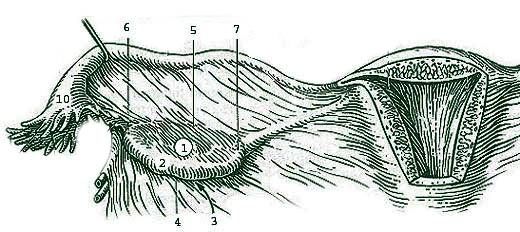Chapter 12. Bioidentical Hormones Found Beneficial After Hysterectomy
 Chapter
12.
Chapter
12.
Bioidentical Hormones
Found Beneficial After Hysterectomy
Should My Ovaries Be Removed ?
Forty Three year old Eva sought medical advice about
irregular bleeding from massive uterine fibroids. The continuous bleeding interfered with her
lifestyle and caused severe fatigue from the iron deficiency anemia. Uterine artery embolization had been considered
and rejected on the grounds the uterine fibroids were much too large for the
procedure. The interventional radiologist instead recommended hysterectomy. Eva went home, and after thinking for a few
days, finally accepted she would undergo surgery and have the hysterectomy.
What are Uterine Fibroids?
Uterine fibroids are benign growths in the uterus that can grow to large size causing irregular bleeding and pressure on the abdominal organs. They are fairly common and can be detected with pelvic examination, and confirmed with pelvic sonogram and MRI scan. Massive uterine fibroids are most commonly treated with an operation called a hysterectomy operation which removes the uterus along with the fibroid tumors inside the uterus. This form of treatment is usually successful with a good outcome.
Visiting the OB Gyne Surgeon
Next, Eva paid a visit to the Ob-Gyne surgeon to discuss her operation. The surgeon recommended a COMPLETE hysterectomy with removal of both ovaries. Sitting in the surgeon's office, Eva timidly protested. "Why remove my ovaries?" asked Eva. The surgeon replied, "Removing the ovaries eliminates the chance of ovarian cancer, and you don't need them anyway."
To Remove or Not to Remove the Ovaries? That is the Question
So now Eva was again in my office asking for my opinion. Should she go against the surgeon's advice and insist on preserving her ovaries, or should she follow the surgeon's advice to have a COMPLETE hysterectomy with removal of the ovaries ? The ovaries are important because they are the hormone factories that pump out women's hormones on a daily basis. Removing the ovaries removes the source of women's hormones causing all hormone levels to decline to low levels, immediately sending the woman into Menopause.
Studies Show Removing Ovaries Increases Mortality
Luckily, the answer to Eva's question can be found in the medical literature. William Parker MD and Cathleen Rivera MD reported that removing the ovaries is detrimental to overall health and results in increased mortality. (1)(2) Dr. Parker followed 30,000 women for 24 years after their hysterectomy. Half the women had ovaries removed and the other half had their ovaries preserved. The group with ovaries removed did, in fact, have a lower rate of ovarian and breast cancer. However, this was overshadowed by a marked increase in death from heart disease and other cancers. The group with the ovaries removed had a higher all-cause mortality rate, and therefore Dr. Parker recommended that pre-menopausal women preserve the ovaries. Dr Parker also found that postoperative hormone replacement is very beneficial at reducing heart disease risk. (1)
In a second study, Dr Cathleen Rivera followed 1,000 Pre-Menopausal women (under age 45) after hysterectomy, and found that removal of the ovaries resulted in a disturbing 84% increase in death from heart disease. However, if these women were given estrogen replacement after ovarian removal, they were protected with a 35% decrease in mortality from heart disease.(2) I thought this finding was rather impressive.
Bioidentical Hormones After Hysterectomy
These two studies provide convincing evidence of the health benefits of hormone replacement after hysterectomy. Although the patients in these two studies were given Premarin which is a natural hormone (from a pregnant horse), we find that a cocktail of bioidentical hormones including estradiol, estriol, progesterone, DHEA and testosterone works as well or better than the horse hormones. Since all women are humans, it is preferable to prescribe human hormones rather than horse hormones, from pregnant mares, also called Premarin.
|
Important Point: |
|
Preserving the ovaries during a hysterectomy is beneficial to health , and should be strongly considered in the younger pre-menopausal age group. If the ovaries are removed, bioidentical hormone replacement is then advised as beneficial for health. |
What about preventing ovarian cancer and breast cancer in high risk
groups?
For women at high risk with familial breast and ovarian cancer, and positive BRCA genetic markers, Dr Parker says it makes sense to go ahead with removing the ovaries for these people in high risk groups.
For references and links, see my web site: www.bioidenticalhormones101.com
Articles with Related Interest:
Bioidentical Estrogen Could Have Saved 50,000 Lives
References for Chapter 12. Bioidentical Hormones Found Beneficial After Hysterectomy
(1) http://www.ncbi.nlm.nih.gov/pubmed/19384117
Obstet Gynecol. 2009 May;113(5):1027-37. Ovarian conservation at the time of
hysterectomy and long-term health outcomes in the nurses' health study. Parker WH et al.
(2) http://www.ncbi.nlm.nih.gov/pmc/articles/PMC2755630/?tool=pubmed
Menopause. 2009 Jan–Feb; 16(1): 15–23.
Increased cardiovascular mortality following early bilateral
oophorectomy. Cathleen M. Rivera, MD et al.
(3) http://www.businesswire.com/portal/site/home/permalink/?ndmViewId=news_view&newsId=20090420005411&newsLang=en
April 20, 2009 New Study Finds Removing Ovaries During Hysterectomy
Increases Risk of Death, Outweighs Benefits
(4) http://www.news-medical.net/news/2009/04/20/48588.aspx
Removal of ovaries during hysterectomy increases risk of death, outweighs
benefits April 2009

 Chapter
12.
Chapter
12. 